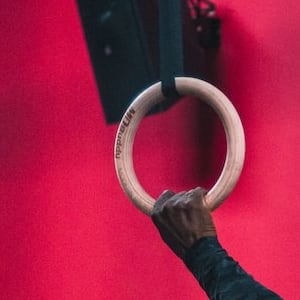bend over backwards: Idiom Meaning and Origin
What does ‘bend over backwards’ mean?
The idiom "bend over backwards" means to make a great effort or sacrifice to help someone or achieve something, even if it is difficult or inconvenient.

Idiom Explorer
The idiom "jump through hoops" means to go to great lengths or make a considerable effort to achieve or satisfy someone's demands or expectations.
The idiom "go to the ends of the earth" means to do everything possible or make extreme efforts to achieve or find something.
"Go to great lengths" means to put in a lot of effort or take extreme measures to achieve something.
The idiom "go the extra mile" means to put in extra effort or go beyond what is expected in order to achieve a goal or provide exceptional service.
The idiom "go overboard" means to go to great or excessive lengths, often beyond what is necessary or reasonable. It implies an extreme or exaggerated action or behavior, often resulting from enthusiasm or excitement.
The idiom "go out of one's way" means to make an extra effort or to do something that is not required or expected, often to help someone else or to achieve a specific goal.
The idiom "get bent out of shape" means to become excessively upset, angry, or agitated over a minor issue or inconvenience.
The idiom "fork over" means to reluctantly give or hand over something, typically money or possessions, often under pressure or unwillingly.
The idiom "double over" means to bend forward at the waist due to extreme laughter or pain.
Supreme Acrobatics
The idiom bend over backwards is an English expression that describes someone making an extraordinary effort or going to great lengths to accommodate or help another person. It is a vivid and playful metaphor that conveys the idea of contorting oneself physically or metaphorically in order to assist someone else.
One possible origin of the idiom can be traced back to the early 17th century, where the phrase "bend backward" was used in a religious context by the Puritans. In their religious practices, the Puritans believed in the need to demonstrate extreme devotion and humility before God. This involved physically bending backward in a gesture of submission and self-denial.
Another possible origin of the idiom can be found in the world of acrobatics and contortionists. Acrobats and contortionists are known for their ability to bend and twist their bodies in extraordinary ways. The idiom may have developed as a metaphorical reference to their physical abilities, suggesting that someone is willing to contort themselves in order to accommodate or please someone else.
Regardless of its exact origin, bend over backwards has firmly established itself as a commonly used idiom in the English language. Its metaphorical nature allows for a wide range of interpretations and applications.
The idiom bend over backwards is most commonly used in informal and conversational contexts. It can be employed in a variety of situations to highlight the extent of someone's willingness to help or their commitment to a particular cause. The idiom is not limited to any specific demographic or region and is widely recognized and understood by English speakers.
While the idiom bend over backwards has a clear and straightforward meaning, its figurative nature allows for a level of subjectivity and interpretation. The phrase can evoke different images and emotions depending on the context in which it is used.
The idiom bend over backwards is an expressive and playful phrase that conveys the idea of making an extraordinary effort or going to great lengths to help someone. Its origins may be rooted in religious practices or the world of acrobatics, but the precise etymology remains uncertain.
It is worth mentioning that the idiom "go out of one's way" is closely related to bend over backwards. This idiom also conveys the idea of making an effort or doing something that requires extra work in order to accommodate or assist someone. While bend over backwards emphasizes the extent of the effort, go out of one's way highlights the extra steps or actions taken to help someone.
An example of using both idioms in a sentence could be: "She really went out of her way and bent over backwards to help her friend move into her new apartment." This sentence showcases the willingness to make an extraordinary effort and go above and beyond to assist someone.
Another related idiom is "jump through hoops." This phrase also emphasizes the idea of making a significant effort or going through extra steps to please or accommodate someone. The difference with bend over backwards is that "jump through hoops" often implies a sense of frustration or inconvenience in the process.
For instance, someone could say: "He had to jump through hoops to get his boss's approval for the project, but he was determined to succeed." This sentence illustrates the idea of overcoming obstacles or challenges to achieve a goal, even if it requires a considerable amount of effort.
The idiom bend over backwards is a colorful expression that signifies making an extraordinary effort or going to great lengths to help someone. Its exact origin is uncertain, but it has become a widely used phrase in the English language. It can be used in informal and conversational contexts to illustrate exceptional effort and dedication. Additionally, the related idioms "go out of one's way" and "jump through hoops" further highlight the idea of going above and beyond or overcoming obstacles to assist or accommodate someone.
Example usage
Examples of how the idiom "bend over backwards" can be used in a sentence:
- He always bends over backwards to help his friends in any way he can.
- The company is willing to bend over backwards in order to keep their best employees satisfied.
- She is constantly bending over backwards to please her demanding boss.
More "Effort" idioms



